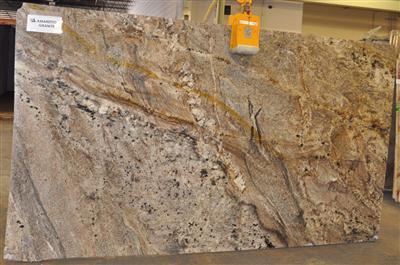Safety Tips for Using Space Heaters
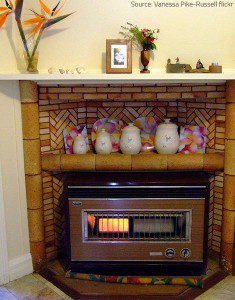
This charming imitation of a real fireplace also poses fire risks if adequate safety measures are not taken.
For many people their warm and cozy home is the ultimate refuge from the outside world. It is the one place where they can relax, do whatever they feel like and just spend some happy moments with their families. And that is especially true during the cold season when the adverse weather renders many favorite outdoor activities impossible and the comfort and the warmth of one’s own home makes it all the more attractive. But because ice and snow cover the world outside, using some kind of heating equipment is the only way to provide this much desired cheerful and warm atmosphere.
Without a doubt, central heating is the most efficient and safe method of warming your home but it is not always available, or in some cases – just not enough. Fireplaces bring unique charm and pleasure to any residence, but they are not always a suitable option, especially in apartments. Space heaters on the other hand, provide the easiest and most convenient method of warming any place. What is more, they can be used practically anywhere because there are no restrictions or special requirements for their operation. But if you decide to avail yourself of a space heater, you need to be aware of several facts concerning their safe and proper usage because they drastically increase fire hazard.
There are several simple ways to protect your home and your family from the serious fire risks posed by a space heater.
What To Look For Before Buying A Space Heater
In order to prevent future fire damage, your first step should be to purchase a quality heater. Here are some factors to consider:
-
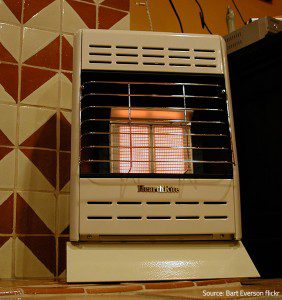
A gas heater is very efficient when you need to warm up a space quickly.
Only buy a device that has been tested to the latest safety standards by a reliable nationally recognized testing laboratory. Mind the fact that older models may not meet up-to-date safety features. The heating unit you are about to purchase has to be appropriately certified and labeled;
- Opt for electric heaters because they are always much safer than the ones powered by kerosene or other fuels. Apart from fire hazards, the latter pose a health risk of carbon monoxide poisoning;
- When choosing an electric space heater, check for a built-in thermostatA thermostat is a device that monitors and regulates tempera... More. Also, take it into account that oil heaters do not reach dangerous surface temperatures and thus the risk of a nearby item catching fire as a result of overheating is significantly lower. However, they warm up more slowly than a wire-element heater;
- Make sure that your chosen appliance has built-in safety features like a timer and an automatic shut-off that cuts power immediately if the heater is toppled over or some other accident happens.
Electric Space Heaters Safety
If you have been prudent enough to purchase an oil-filled radiator or a natural stone heater, you will probably never have to deal with fire damage. Fan heaters and other wire-element heating devices, however, may be rather dangerous if you fail to provide adequate safety. Anyway, there are reasonable precautions to take that will considerably improve the level of fire safety in your home, regardless of the specific type of electric heater you have chosen.
-
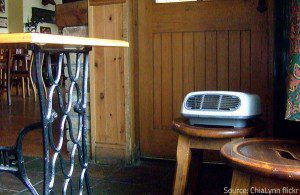
It comes as no surprise that home fires increase drastically during the winter.
Read any warning labels and the manufacturer’s instructions carefully and follow them strictly BEFORE plugging the heater into an electric power source;
- Check for cracked plugs or loose connections before each use and if you notice frayed, worn out, or damaged ones, do not turn on the heater before eliminating the problem. Also, be sure to replace any malfunctioning parts;
- Avoid extension cords because they can easily overheat and cause a fire, especially if they are not heavy duty cords marked with a power rating higher, or at least equal to the one on the label of your device. It’s better and safer to plug the heater directly into a power outlet;
Fuel Burning Space Heaters Safety
As already mentioned, gas and kerosene heaters pose much greater risks than electric ones, especially regarding the possibility of carbon monoxide poisoning. Therefore, these devices must only be used in well-ventilated premises and with extra care.
-
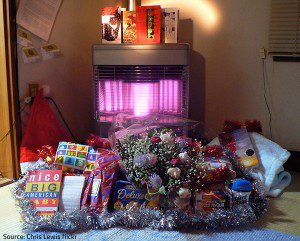
Here is a good idea if you want to set your home on fire.
Unvented combustion space heaters are definitely not recommended and even illegal in some states. They can produce dangerous emissions of carbon monoxide or nitrogen oxide. Opt for a vented unit which is actually a sealed combustion heater which is more efficient and much less likely to backdraft;
- Look for a built-in mechanism that shuts the heater off when it detects low ambient oxygenOxygen is a chemical element essential for combustion and li... More;
- Always refuel your heating unit out of the room, in a well-ventilated area;
- Use only the right kind of quality fuel your heater was designed to burn and never mix gasoline with kerosene, or any different types of fuel, for that matter;
- Keep a window slightly ajar or open it now and then to allow fresh air to flow in;
- Allow sufficient time to elapse before relighting, if the gas heater pilot light goes out;
- If you can smell gas, never light the heater! Have it inspected for leakage or some other malfunctioning.
Comprehensive Space Heater Safety Tips
There are some unquestionable rules you need to observe in order to prevent devastating space heater fires.
Regardless of the type of heating equipment you have purchased, the following safety tips will help you enjoy the warmth of your home during the chilly winter months without risking the danger of a fire.
-
- Place your heater on a hard level surface – one that is flat and inflammable. Do not put the appliance, even if it is a small one, on tables, chairs, cabinets or any other furniture pieces. It will be much safer if there are no carpets, mats or rugs under the heater;
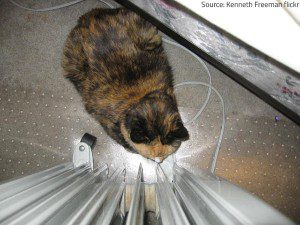
Sometimes curiosity should not be encouraged.
- Find a safe place for your device, away from doorways and areas you often walk around because anyone can easily trip on it;
- Keep furniture, curtains, bedding or any combustible materials, such as clothing or newspapers, at least three feet away. Actually one fourth of all space heater fires were caused by nearby flammable objects overheating and catching fire;
- Supervise children and pets in the room, not only because they may knock the heater down, but also because they may touch the heating element or the very hot surface of your device and get burnt;
- Always turn off the heater when you go out of the room for a longer period or when you go to bed, and unplug it before leaving your home. Never leave a heater unattended;
- Install fire alarms and smoke detectors throughout your home. Do not forget to test them regularly and supply fresh batteries when needed;
-

Remember!
Do not use space heaters in the bathroom and keep them away from water;
- Heating equipment is not designed to dry clothing, warm bedding or cook food – its purpose is to warm your living space only!
- Before storing a space heater after usage, make sure it has cooled down completely.
Do not let yourself be fooled into underestimating the peril that lurks inside space heaters when they are used without caution. Still, all that it takes is a little prudence on your part and your home will not be engulfed in flames and smoke, but shrouded in delightful warmth.










